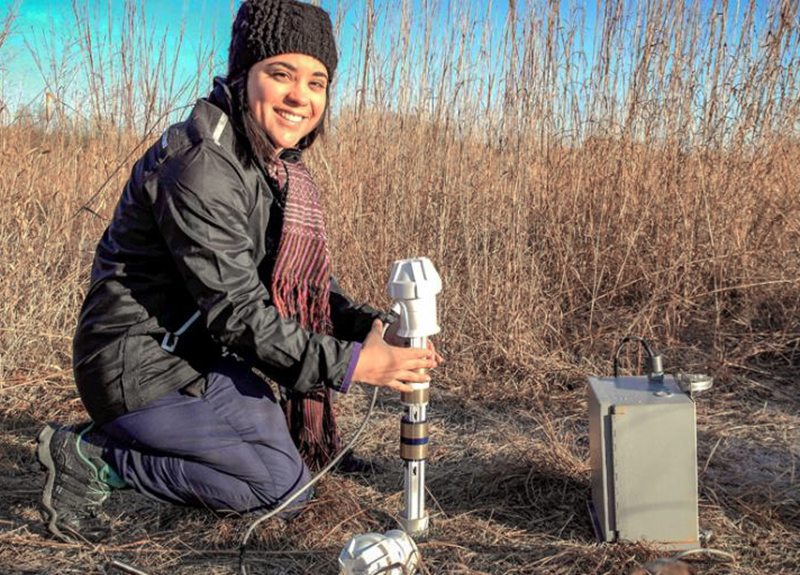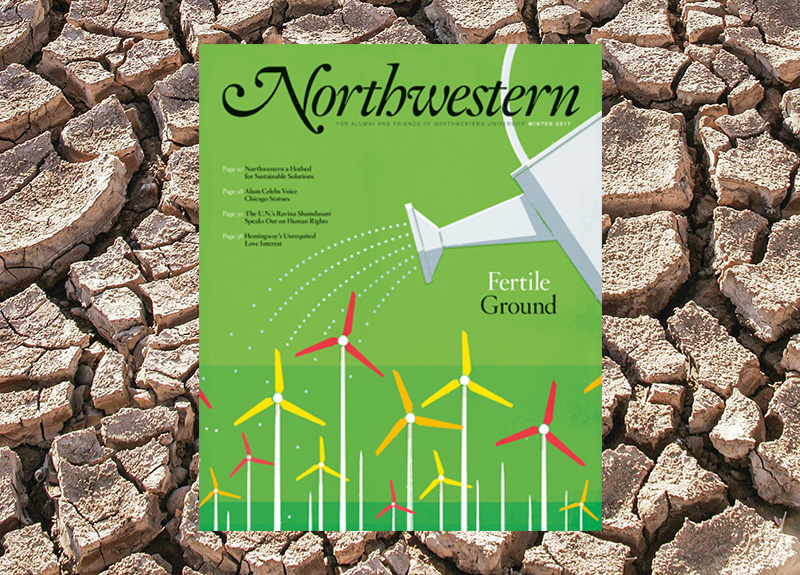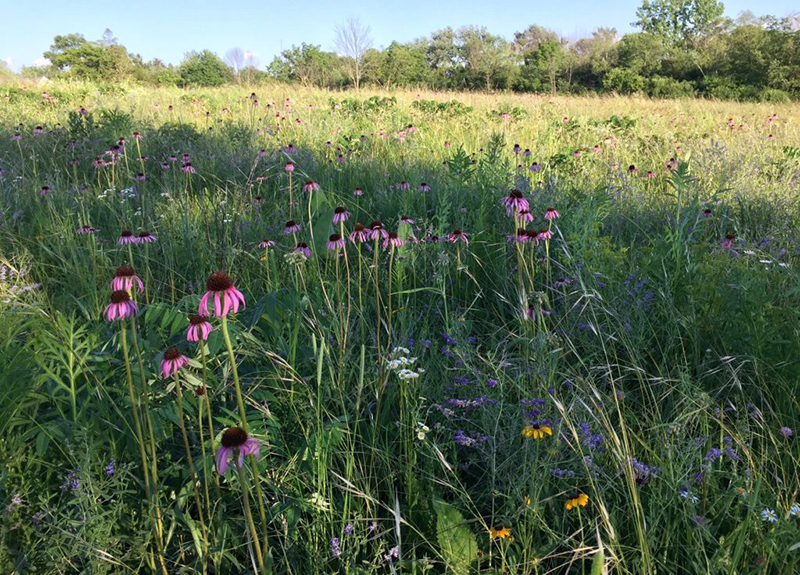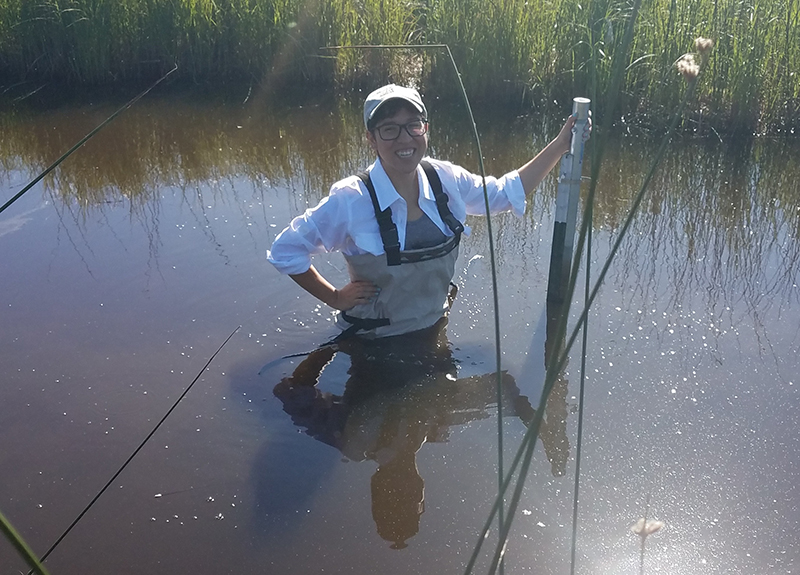Originally published by The Graduate School at Northwestern
Liliana M. Hernandez Gonzalez is a PhD candidate in the Department of Civil & Environmental Engineering in the McCormick School of Engineering. Her research focuses on determining the ecological resilience of urban green spaces in the Chicago metropolitan area and their benefits for storm water retention using a distributed high-frequency sensing network. Liliana is a former Summer Research Opportunity Program (SROP) participant and has been recognized as a National Science Foundation Graduate Research Fellow, National GEM Consortium Associate Fellow, and Walter P. Murphy Fellow. In addition, Liliana was recently inducted into the Edward Alexander Bouchet Graduate Honor Society.
How would you describe your research and/or work to a non-academic audience?
I am monitoring water levels, soil moisture, and rainfall in green spaces, such as wetlands and green roofs around the City of Chicago to determine their benefits for storm water retention. The frequency and magnitude of rainfall events in Chicago and other cities are increasing due to climate change. Therefore, I am using a high-frequency sensing network that could help us create models for different scenarios in the future. With this research, we can provide research-based recommendations to engineers and policymakers for the design of these spaces in cities, especially in flood-prone communities.
What have been some of the most memorable twists and turns of your career?
One of the most memorable twists and turns of my career was when I was accepted into the Northwestern Summer Research Opportunity Program (SROP), where I had the opportunity to conduct research for the first time in environmental engineering with my current adviser, Dr. Aaron Packman. Through this experience, I fell in love with the field and changed research interests from materials science and engineering to environmental engineering.
Tell us what inspired your research and/or work.
The increase of populations living in urban areas, the effects of climate change, and the shifting of land covers and ecosystems are increasing our flooding problems, specifically in our poorest and most vulnerable communities. Therefore, we need to find solutions to be able to adapt to and overcome these challenges. It has been proposed to use nature to intercept and infiltrate surface runoff. At the same time, nature can offer other benefits, such as the support of biodiversity, improvement of water quality, and spaces for recreation.
Whom do you admire in your field and otherwise, and why?
One person that I admire is Miguel Roman, a scientist at NASA who is working with remote sensing. He was recently recognized with the Presidential Early Career Award for Scientists and Engineers. Roman completed his undergraduate degree at the same university as me, the University of Puerto Rico at Mayaguez, and is now a renowned scientist who is using his work to support Puerto Rico’s recovery in the aftermath of Hurricane Maria.
Why Northwestern?
After spending the summer of 2014 at Northwestern, I knew that this was a place where I could spend the next five to six years of my life. Northwestern is an excellent research institution with a collaborative environment, and my research interests aligned with those of my adviser, Dr. Aaron Packman. Coming from Puerto Rico, it was important to me to be near a body of water, so having Lake Michigan right here was a huge plus. Additionally, I love being close to downtown Chicago and having the opportunity to enjoy different cultural activities, museums, restaurants, and its diverse population.
What inspires you?
I find inspiration in nature, specifically mountains, rivers, and beaches. I also feel inspired when talking with my friends, who are fiercely motivated, encouraging, and positive. Visiting new places, meeting new people, and seeing different perspectives of the world always leave me inspired and recharged for the days ahead.
What did you originally want to be when you grew up?
When I was in middle school, I wanted to be a marine scientist. This stemmed from my love for the oceans, conservation efforts, and a curiosity to learn and explore the unknown. I am not a marine scientist, but I have chosen my career path for the same reasons: a passion for nature and a desire to help with environmental problems.
What advice would you give your younger self or someone considering a similar path?
My advice for students is to start looking for opportunities early, such as research experiences, summer internships, volunteering experiences, and open houses that can help them make informed decisions regarding their graduate school endeavors. There are many opportunities out there, especially for underrepresented minorities, but we often do not know about them. Additionally, it is always a good idea to find mentors that can guide you throughout the different steps needed to reach your goals.
Tell us about a current achievement or something you're working on that excites you.
Recently, my first manuscript as a lead author was published in a scientific journal. Also, I am looking forward to attending the prestigious Gordon Research Conference, where I will be able to learn and network with experts in my research area. In addition, I am excited to visit the University of San Martin in Buenos Aires, Argentina this summer as part of an effort to increase collaborations between this institution and Northwestern’s Department of Civil & Environmental Engineering.
What are you most proud of in your career to date?
In order to conduct my research, it is necessary to get data from environmental sensors deployed in urban green spaces in Chicago. When I started graduate school, none of these sensors were installed, but I am extremely proud to say that I was able to deploy these sensors in different sites throughout Chicago with the incredible help of my lab mates, undergraduate students, and collaborators. These sensors will not be only used for my research project but the data will be publicly available for the scientific community for many years to come.






